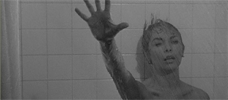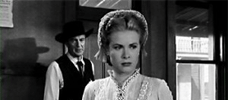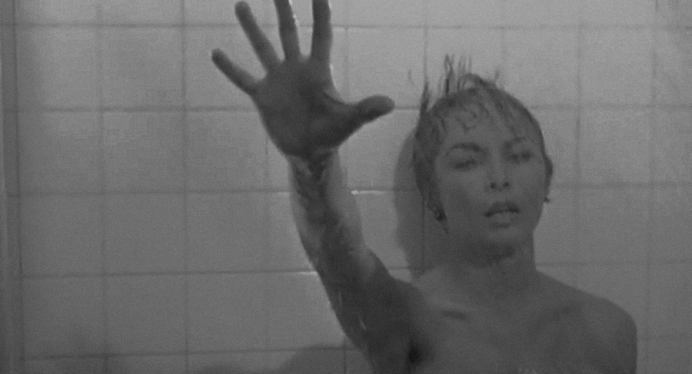Reviews
Alfred Hitchcock
USA, 1960
Credits
Review by Katherine Follett and Rod Bastanmehr
Posted on 28 January 2011
Source Universal DVD
Categories Blind Spots
Uh-uh, Mother-m-mother, uh, what is the phrase? She isn’t quite herself today.
Introduction by Rod Bastanmehr
With its technical wizardry, its Freudian psychology, its manipulation, and its balance of sensation and sentiment, Psycho pushed our expectations of sex in cinema, of violence in cinema, of protagonists and morals and whether they are mutually exclusive. It tapped into the experience of movie watching, a hybrid of vaudeville and narrative. Hitchcock didn’t give the audience what they wanted, he told them what they wanted.
As for myself, I first became enamored by film at a young age, but it wasn’t until I saw Psycho at age 8 that I was permanently fixated on the movie screen (and eternally defiant towards my shower). I first watched the film in the form of Gus Van Sant’s 1998 remake. This isn’t a negative, and I was nonetheless impressed with its tale of morals, desire, obsession, and sexual repression. But it wasn’t until I saw Hitchcock’s 1960s original that I found myself infatuated. The film was the same cavern of terror, but the camera wasn’t just filming it: it was experiencing it. I could feel the kind of control that only comes from someone who knows his audience, someone who knows what they want. I was 8, and I didn’t know what it was I needed from a film, but Psycho tapped into it before I had a chance to find out. By now, I roughly estimate having seen it nearly 15 times. This number is still too low.
So often, manipulation is looked down upon in the cinema. The desperation that comes from twist endings, the candy-hokum of exploitation films, the choice of style over substance. But Psycho made the B-movie chic. It ushered in a new moment where we didn’t look at films as merely vehicles of sentiment, but as vehicles of sensation. It tantalized teens, but not everyone heralding the film was pre-pubescent.
Review by Katherine Follett
Does knowing a spoiler ruin a film? The easy answer is, “not a good film.” Some movies do pack their whole payoff into a twist ending, hanging 89 minutes on a single gimmick. But you don’t have to watch it twice to realize that M. Night Shyamalan’s The Village isn’t that rewarding with or without the element of surprise. In better films, what first came as a shock can still be a powerful moment the second or third time around. No one is surprised when Luke learns his paternity, but the scene in question is still satisfying because it is the climax of a compelling narrative and a devastating revelation to a character we care about.
Psycho has not one, but two spoilers, both of which are long past being spoiled for pretty much anyone paying attention. The first is the shower scene in which Marion Crane is suddenly murdered; the second is that Norman Bates is himself “Mother.” Psycho is one of the most revered movies ever made. Undoubtedly, the film scholars and movie lovers who declare it so have seen the film post-spoiling. So I didn’t much worry when I sat down to see Psycho for the first time, even though I’ve long known the critical plot twists. Obviously, Psycho shouldn’t be the kind of movie that gets ruined just by knowing the ending.
What I discovered is that the effect of a spoiler doesn’t just depend on a film’s quality. It also depends on the film’s intention and style, and on the viewer’s mindset and expectations. The first time I watched Psycho, it didn’t have the impact I’d hoped. I think this was because of “spoilers,” but not simply because of the lack of surprise; it was something more complicated.
The word I think best captures Alfred Hitchcock’s strengths as a filmmaker is strategic. Hitchcock is a master craftsman, a genius with the technical aspects of writing, pacing, shooting, and editing a film. He plays with psychology and archetypes and expectations in brilliant ways. But filmmakers with such an intellectual, technical approach are often suspected to lack heart. And “heart” might be the most succinct way to describe the difference between The-Village and Empire-Strikes-Back style spoilers. Spoilers with no heart are clever tricks, while those with heart are not just shocks, but turning points critical to the characters and the story.
But watching Psycho, especially keeping in mind the second, “Mother” spoiler, it’s clear that this distinction isn’t so cut-and-dried. Some clever tricks are better than others. For example, The Usual Suspects isn’t much more than a puzzle with an unexpected solution, but it’s a brilliantly constructed puzzle that’s enjoyable for the process as well as the prize. I felt the same satisfaction leading up to the corpse-reveal in Psycho, noting the ingenious ways Hitchcock placed hints and red herrings, admiring how the secret informed the subtle and brilliant performance of Anthony Perkins as Norman Bates, dissecting how the slasher-film style tension turned from a standard startling “Boo!” to something much more disturbing when we saw Mother’s true form. In the case of “Mother’s” identity, it would have been great not to know ahead of time, but watching the trick expertly play out offered its own enjoyment.
Where I got into trouble was when the spoilers served not just to give away the ending, but also to change my expectations going into the film. This was especially true of the shower scene. The Shower Scene. The Shower Scene! It was all I’d seen of Psycho, but I’d seen it a thousand times. I knew how to break down its revolutionary use of close-ups and quick cuts. I could analyze the famous score. I even knew they used Hershey’s syrup for blood. So the first time I watched Psycho, it felt less like filling in a long-missing blank than it did like sitting through an entire album by a one-hit wonder. I couldn’t help squirming and wondering, “When are they gonna get to the Shower Scene!?” And when they did get to the shower scene, well, I’d seen it a thousand times before. In my impatience, I’d inadvertently ignored its context, so it had about the same effect on me as it had in hundreds of TV retrospectives, which is to say, not very much.
On the other hand, another thing I knew about the shower scene was that it initially shocked audiences not only because of its technical brilliance, but also because of what it meant. It brutally killed off the sympathetic protagonist less than halfway through the movie, shattering audience expectations of character and narrative. Obviously, for the scene to have such an impact, the character and narrative leading up to it have to be done right—that is to say, with enough heart to get the audience fully involved. But having heard so much about the scene’s technical brilliance, and having seen it in isolation so many times, I’d made the mistake of ignoring its context.
So I watched the movie again, noting the irony that a movie so dependent on surprises might be more effective the second time. Knowing when the Shower Scene was coming kept me from fidgeting, and I was able to see what Hitchcock achieved.
Probably the most compelling parts of Psycho are not the twists, but the characterizations of Marion Crane and Norman Bates, and I would argue that the more difficult one to pull off was Marion Crane. Both characters manage to elicit our sympathy despite immoral deeds. Obviously, Marion’s impulsive theft is the lesser evil, but Marion Crane doesn’t have Norman Bates’ advantage of being darkly fascinating. Instead of being a freak who manages to earn our pity, she has to be a sympathetic and normal person who does something bad and manages to keep our support.
The very first scene between Marion and her boyfriend Sam - surprisingly intimate, honest, and tender for the time - immediately gives us the sense of impulsiveness and insecurity that will spark Marion’s crime. Janet Leigh shrewdly plays the following scenes in the realtor’s office - the wheedling co-worker, the condescending boss, the invasive client, even her own automatic competence - not as pathetic or repressed, but rather poker-faced. We understand that Marion isn’t just longing for escape from her boring life; she is intelligent, shrewd, and spunky. So when she makes off with the money, we not only feel for her, but even hope she’ll get away with it. We curse the things that get in her way. And when she’s so shockingly murdered, we’re robbed not only of an admired character, but also of our hopes for the outcome of her caper.
Now that both the main character and what we thought was the central conflict are gone, the film is obviously in danger of disintegrating. My old playwriting teacher, Connie Congdon, often talked about the “baby-duck” effect, in which audiences imprint on the first dynamic character they see, so it pays to introduce your protagonist immediately. After the Shower Scene, our mother duck is gone, and our natural instinct is to latch onto the next moving thing that happens by—Norman Bates. Though I knew ahead of time that Norman is the killer, Perkins’ fragility, boyishness, and simple sadness draw in any orphaned sympathies. Even when twinges of a smile flicker over his face as he watches Marion’s car disappear into the marsh, we understand, if not empathize, with his pride in having saved “Mother.” I would say that the film does suffer some after Marion disappears—Norman isn’t on screen as often as Marion was (for obvious reasons, since we can’t see him being Mother); minor characters such as Sam and Lila aren’t as compellingly drawn; and the “now-it’s-time-for-science!” psychologist’s wrap-up seems unnecessary. But the fact that we keep watching - and not just to see how the mystery is solved, but also because we now care about Norman - is a great feat not just of filmmaking, but of characterization and storytelling.
The thing about the Shower Scene is that it can’t stand on its own, any more than Luke and Vader’s battle could stand on its own if you didn’t know the backstory. Yet on its own is the way the Shower Scene is most often presented, and the only way I’d ever seen it. Hearing so much about its technical brilliance only served to underscore the idea of the Shower Scene as its own unit, a clip to be admired in or out of context, when in fact the context is essential. The Shower Scene doesn’t work without the film, and the film doesn’t work without the Shower Scene. Perhaps “spoilers” of this type, the type that start out as surprises but end up as climactic turning points, shouldn’t really be called “spoilers” at all, since knowing them can’t really spoil a film as well-made as Psycho. The only thing that risked spoiling the movie was making such a big deal out of the spoiler that the rest of the movie became ancillary. Obviously, the Shower Scene is essential; but our over-emphasis of it hides the fact that Psycho hangs inextricably together, head, heart, and all.
More Blind Spots
-

Pee-wee’s Big Adventure
1985 -

The Matrix
1999 -

Amélie
2001 -

The Breakfast Club
1985 -

Psycho
1960 -

Blade Runner
1982 -

Chinatown
1974 -

Monty Python and the Holy Grail
1975 -

Rocky
1976 -

High Noon
1952 -

Ferris Bueller’s Day Off
1986 -

Taxi Driver
1976 -

The Godfather
1972 -

E.T.
1982 -

Pulp Fiction
1994
We don’t do comments anymore, but you may contact us here or find us on Twitter or Facebook.



